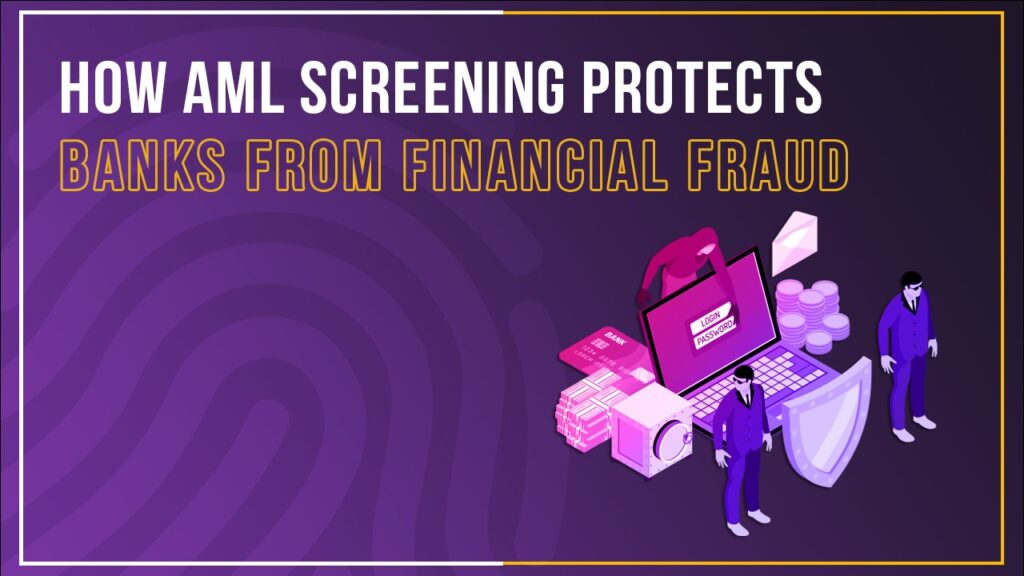Financial institutions are under enormous strain to protect their businesses and credibility in a time when fraudulent activity is becoming increasingly complex. They have anti-money laundering (AML) screening as one of their best defences. This procedure is essential for identifying and stopping illegal actions including fraud, money laundering, and funding terrorist activities. Financial institutions can prevent financial deception and heavy regulatory fines by identifying suspect behaviour early on through thorough scrutiny of clients, deals, and highly hazardous companies. We will explore the importance of AML screening, its operation, and how it protects banks' financial infrastructures from ever-changing dangers while maintaining compliance in this blog.
What is AML Screening?
Financial companies utilise AML (Anti-Money Laundering) screening to identify and stop illicit activities like scams, laundering funds, and terrorism funding. To find any possible dangers, it entails comparing clients, transactions, and other organisations to archives of adverse media, politically exposed persons (PEP) lists, and international sanctions listings. By identifying or barring those engaged in questionable or illegal activities, AML screening aims to guarantee that banks only do business with respectable people and organisations. By taking this proactive stance, banks may stay in compliance with regulations, keep out of trouble with the law, and prevent their financial structures from being used illegally.
Banks can reduce risks and improve their standing as reliable organisations dedicated to maintaining honesty and openness in the international financial industry by putting AML screening into practice.
Why AML Screening is Essential for Banks
AML screening offers banks and other financial organisations several levels of security, making it an essential weapon in the battle against financial misconduct. Here's why it's essential:
1. Prevent Financial Crime: AML screening assists banks in identifying and preventing transactions or connections with people or entities engaged in fraud, money laundering, and other illegal activity. In order to stop fraudsters from abusing the financial system to obtain illicit profits, early discovery is essential.
2. Regulatory Compliance: Strict AML compliance for banks is required by international regulatory agencies. Heavy fines, legal repercussions, and harm to one's credibility may follow noncompliance. By ensuring that banks adhere to these strict guidelines, AML screening helps them stay out of trouble and maintain their reputation in the financial sector.
3. Preserve Reputation: Dealing with clients who have been connected to illegal behaviour can seriously damage a bank's standing. By avoiding connections with clients with elevated risks, AML screening shields the bank from public scrutiny and upholds confidence among partners, customers, and regulators.
4. Reduce Financial Risk: If left uncontrolled, criminals' frequent use of banks to launder illegal funds can cause institutions to suffer large financial losses. By identifying questionable activity before it causes harm, AML screening reduces these risks.
AML screening is essentially a required protection that helps banks prevent financial fraud, preserve their reputation, and uphold the reliability of their operations—it is not merely a legislative mandate.
Fraud Prevention with AML Screening in Banks
Among the largest risks banks confront is deception since criminals are always coming up with novel methods to take advantage of financial systems. By enabling banks to recognise and reduce risks before they become serious financial crimes, AML screening is essential to the fight against fraud. AML screening helps prevent fraud in the following ways:
1. Early Suspicious Activity Detection: AML screening enables banks to keep an eye on transactions in real-time, highlighting any odd behaviours or trends that can point to fraud, like large transfers, erratic account usage, or activities associated with areas of concern. The prompt identification of these warning signs allows banks to look into the matter further and stop possible fraud.
2. Enhanced Due Diligence: AML screening entails thoroughly investigating both new and current clients, confirming their identities, and checking them against lists of politically exposed individuals (PEPs), international sanctions, and negative publicity. This guarantees that banks aren't unintentionally working with people who are engaged in fraudulent activity.
3. Preventing Identity Fraud: By verifying that people are who they say they are, AML screening also assists banks in preventing identity fraud. Banks are able to prevent deceptive accounts from being created under fictitious identities by cross-referencing consumer data with trustworthy databases. Banks may both meet legal obligations and create a strong defence against fraud by including AML screening into their risk administration system. This will shield their assets and clients from financial crime.
The Critical Role of Name Screening
By helping banks to recognise and reduce the risks connected to illegal activity, name screening is essential to AML screening and fraud prevention. Banks can identify individuals or organisations that may have connections to fraud, money laundering, or funding of terrorism by comparing client names with surveillance lists, politically exposed persons (PEP) records, and worldwide sanctions listings. This procedure ensures legal compliance by preventing criminals from accessing the financial system. Name screening is an essential part of fraud prevention measures since it lowers the risk of processing shady transactions or enrolling customers with elevated risks. Name screening improves a bank's capacity to identify problems early and safeguard its assets and reputation by reducing false positives with sophisticated systems.
AML screening is a vital defence for banks in an environment where criminal activity has grown more complex. It helps them protect their business, preserve their credibility, and adhere to strict requirements. Banks can reduce financial risks, stop fraud, and identify suspicious activity early by using strong AML screening procedures, such as enhanced due diligence, instantaneous fashion transactional surveillance, and name screening. In the end, AML screening not only shields the bank from financial crime but also strengthens confidence with customers and regulators by showcasing a dedication to honesty and openness. Idenfo Direct provides state-of-the-art innovation in sophisticated AML solutions, such as name screening, increased due diligence, and adverse media checks, to guarantee banks and financial institutions stay safe and compliant against changing threats in the financial sector. Visit the website today to find out more about our AML screening solutions: http://mena.idenfodirect.com/









